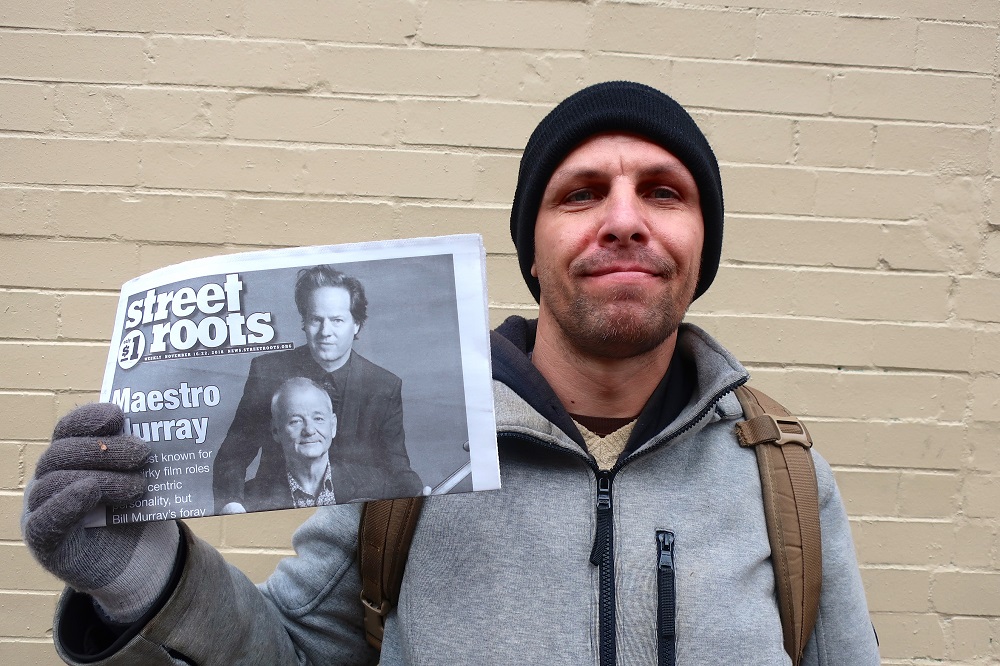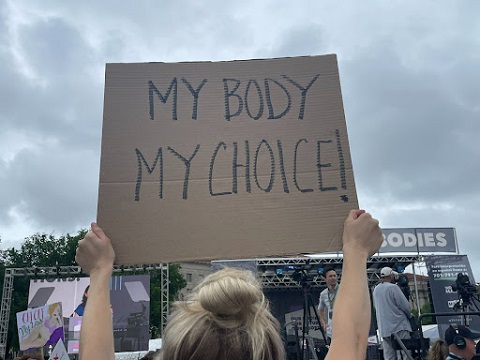By Helen Hill, Street Roots
The steady presence of a gentle soul is a valuable treasure in the Street Roots vendor office. Jason Scheer is just such a soul. Jason is the first to volunteer if there’s a job that needs doing, such as helping carry heavy supplies to the basement or mopping a dirty floor.
“When I first started at Street Roots, I’d come in early and try to get the front chore,” he says. “You get 10 free papers, but it wasn’t the papers I did it for: I cared about keeping the office clean so that when people came in, they’d feel welcome. That’s always been important to me.”
Jason has been with Street Roots since 2011. “It’s been a stable base for me. Without it, I would’ve been just a random guy,” he says.
Jason tells me that Anjali, Street Roots’ volunteer creative writing instructor, “has been my customer for years, since I was sleeping on the steps over by World Foods (at 830 NW Everett). Anjali would pass by, and I used to talk to her; she’d buy papers from me before she started volunteering at Street Roots.”
The arc of Jason’s life during these past eight years at Street Roots has shown a steady movement toward greater stability and balance. When he first started working as a vendor, he was living on the streets. He downplays what he went through. However, he is missing one finger and the tips of a few others after suffering frostbite several winters ago.
“It was wet and snowy, and I just didn’t have a lot of blankets, and where I was, it wasn’t the best spot; it was over in Waterfront Park,” he recalls. “The tips of my thumbs and my finger turned black. I went to Street Roots the next morning and washed my hands. I thought it was dirt, but the dirt wouldn’t come out. I scrubbed and scrubbed, but it wouldn’t come out, so I figured it was frostbite. My feet were OK because I had on dry socks. I always had dry socks because of Street Roots.”
Jason ended up in the emergency room and he was sent to a surgeon who cut away the frostbite. Now, his hands ache when they get cold and he has trouble tying laces and buttoning.
“I still sell Street Roots, but being out in the cold can hurt,” he admits. “I wear double gloves, but that makes it hard to hold the newspapers, especially in the rain.”
It’s rare to hear Jason complain or feel sorry for himself.
“People know how bad it is,” he says. “You can’t go through life complaining; you have to work through all the complaining. It’s easier just to get things done.”
Jason comes from a large family in the Sacramento area. He was the oldest of five. His mother worked in a day care, and his stepfather was a truck driver. “We were low income, but we were happy,” he says.

For family outings they would all pile in the car along with his grandmother and great-grandmother and drive up into the mountains to see the scenery. “I was the shy one; the quiet one. I stuck to my books,” he tells me. “My stepdad tried to be good guy. He was an alcoholic. It was rough, but he stopped drinking and eventually we started growing closer.”
For years, Jason has been using the money he makes selling Street Roots to buy round-trip train tickets to visit his family in Sacramento.
After he returned from a trip this summer, his stepfather died and Jason went to Street Roots to talk about it.
“If I’m having a rough day, I come in and I see all your shining faces and it brightens mine a little,” he says. “Like when my dad died, I can go in there and say, ‘Hey, my dad just passed.’ And you guys say ‘I’m sorry’. At least it’s somebody else that cares. It feels better when somebody else listens. Street Roots is a place where people can feel cared for.”
“Being bipolar made my life pretty rough because you’re not understood in school or at home. You are either hyper or depressed, and nothing you do changes that”
After his experience with frostbite, Jason’s longtime girlfriend, Krista, persuaded him to live in her apartment: “Krista made sure I was inside after that.”
At first, after the long years outside, he was uncomfortable with the feeling of four walls around him.
“Being inside has gotten better,” he admits. “I’ve gotten to a point where I can be indoors – through the grace of God, I guess.”
Two years later, Jason is still living with Krista and, as of last year, his name is on the lease. “Krista and I are good partners. We kind of complete each other,” he smiles. “It’s working out well.”
Another key element of Jason’s improved stability has been treatment for his long-undiagnosed bipolar disorder.
“Being bipolar made my life pretty rough because you’re not understood in school or at home. You are either hyper or depressed, and nothing you do changes that,” he explains. “It’s like riding a car without having your hands on the steering wheel. I was in trouble a lot at school, at home.
“Growing up, they didn’t get me checked or tested. I did it when I was older. I knew there was something wrong. When I was hyper, I would wander the streets all night and all day, because you can’t stop. So I got tested. This last year, I’ve been getting a shot once every three months.”
Jason is treated with Invega, which balances his serotonin and dopamine levels. “It’s helped a lot,” he says.
Jason is hopeful about his future. He’s been working with a counselor and also with the Benefits and Entitlements Specialists Team through Central City Concern to get approved for Social Security benefits.
“I want to pay the bills, and know that I can keep paying them,” he says.
When asked if he is a spiritual person, Jason answers that “I go to church, but I don’t consider that spiritual. Waking up every morning, for me, that’s spiritual. Especially when I was outside, waking up – surviving – was spiritual.”
Courtesy of Street Roots / INSP.ngo




















